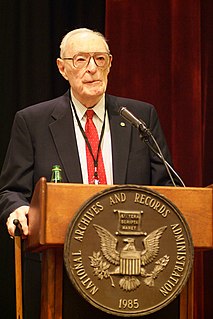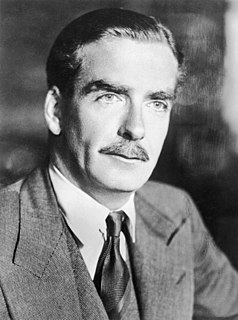A Quote by William J. Clinton
We live in a completely interdependent world, which simply means we can not escape each other. How we respond to AIDS depends, in part, on whether we understand this interdependence. It is not someone else's problem. This is everybody's problem.
Related Quotes
Not everyone knows how to be alone with others, how to share solitude. We have to help each other to understand how to be in our solitude, so that we can relate to each other without grabbing on to each other. We can be interdependent but not dependent. Loneliness is rejected despondency. Solitude is shared interdependence.
For the problem of decision-making in our complicated world is not how to get the problem simple enough so that we can all understand it; the problem is how to get our thinking about the problem as complex as humanly possible--and thus approach (we can never match) the complexity of the real world around us.
The world is too complicated in all parts and interconnections to be due to chance alone. I am convinced that the existence of life with all its order in each of its organisms is simply too well put together. Each part of a living thing depends on all its other parts to function. How does each part know? How is each part specified at conception? The more one learns of biochemistry the more unbelievable it becomes unless there is some type of organizing principle-an architect.
We have a problem with several media taking only a part of the reality and not the whole picture. Some media in the world are more critical towards what's happening than others. It depends on the journalist, it depends how much information they have about the case and which perspective they are asking you from. All of these things can play a role.
I do not know if you have ever noticed that the more you struggle to understand, the less you understand any problem. But, the moment you cease to struggle and let the problem tell you the whole story, give all its significance - then there is understanding, which means, obviously, that to understand, the mind must be quiet.
The question "What shall we do about it?" is only asked by those who do not understand the problem. If a problem can be solved at all, to understand it and to know what to do about it are the same thing. On the other hand, doing something about a problem which you do not understand is like trying to clear away darkness by thrusting it aside with your hands. When light is brought, the darkness vanishes at once.
My first understanding of HIV and AIDS was like everybody else from my generation. In the mid-'80s, we heard about this, and it was terrifying, because we knew nothing about how to respond to it appropriately, and we didn't really understand about how the virus is passed. There was a lot of misconception about that.
It's my opinion that, if Barack did want to solve the gang problem, number one would be to work with people from the inside out, people who can actually give him an accurate analysis of the problem in L.A., because they're in it or at one point were a part of it, and now they're workin' to change it, and redirect the energy and the focus of it. And then consciously take steps to solve the problem. But I don't feel like zero tolerance, strict laws, locking everybody up is a viable means to stop that problem.
Education is the best means-probably the only means-by which nations can cultivate a degree of objectivity about each other's behavior and intentions. It is the means by which Russians and Americans can come to understand each others' aspirations for peace and how the satisfactions of everyday life may be achieved.
The free world has need that its foreign policies should fairly measure the realities of the world in which we live. There are certain principles to which we hold: the sanctity of treaties, good faith between nations, the interdependence of peoples from which no country, however powerful, can altogether escape.
We lack social awareness because we're so focused on what we're going to say next - and how what other people are saying affects us - that we completely lose sight of other people. This is a problem because people are complicated. You can't hope to understand someone until you focus all of your attention in his or her direction.


































